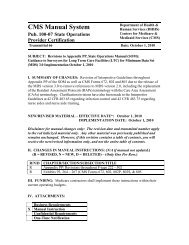LOUISIANA Community Mental Health Services Block Grant ...
LOUISIANA Community Mental Health Services Block Grant ...
LOUISIANA Community Mental Health Services Block Grant ...
You also want an ePaper? Increase the reach of your titles
YUMPU automatically turns print PDFs into web optimized ePapers that Google loves.
the ecosystem for their livelihoods as do so many coastal Louisiana families. In its paper,<br />
"Coping With Technological Disasters: A User Friendly Guidebook," the Prince William<br />
Sound Regional Citizens Advisory Council writes, "Results of Exxon Valdez oil spill studies<br />
indicate that mental health impacts still persist 10 years post-spill. These impacts include<br />
disruption of family structure and unity, family violence, depression, alcoholism, drug abuse<br />
and psychological impairment." This was reaffirmed at the recent meeting of the Institute of<br />
Medicine in New Orleans, at which mental health concerns emerged as the priority health<br />
issue of this disaster. Our Louisiana Spirit crisis counseling teams have already engaged and<br />
counseled more than 2,000 individuals and are reporting increases in anxiety, depression,<br />
stress, grief, excessive and earlier drinking and suicide ideation. <strong>Community</strong>-based<br />
organizations report similar findings. We know that, left untreated, these symptoms can<br />
quickly develop into behavioral health problems that lead to the breakdown of the familial<br />
structures, domestic violence, abuse and neglect. We also know that Louisianians are<br />
suffering uniquely from the compounding effects of the disasters they have faced. Those<br />
disasters have taught us much about how insidious the effect of parental stress, anger, anxiety,<br />
substance abuse and mental illness are on children. Following Hurricane Katrina, an Urban<br />
Institute Paper found that "if parents remain in limbo themselves, and particularly if sadness,<br />
stress, or depression continues to color their interactions with their children, the risks of<br />
derailing children's development deepen." (Friday, July 9, 2010)<br />
Information Technology and Decision Support<br />
The Division of Planning, Information Management and Performance Accountability is dedicated to<br />
the ongoing development and use of information technology in support of quality improvement,<br />
performance accountability, and data-based decision-making statewide, and for each OMH Region,<br />
LGE, and state hospital. With progressive implementation of the Office of <strong>Mental</strong> <strong>Health</strong> Integrated<br />
Information System (OMH-IIS), legacy systems are being phased out in favor of one, comprehensive,<br />
integrated web-based information system. Additional OMH-IIS modules have been implemented,<br />
including Assessment; Admission/Discharge/Transfer, and a Service Ticket/ Progress note module<br />
this past fiscal year. Plans and training are also underway for the acquisition and implementation of a<br />
statewide Electronic Behavioral <strong>Health</strong> Record system. The Division has continued to enhance the<br />
OMH data Warehouse and decision support system (Decision Support On-line) for statewide clientlevel<br />
administrative data, and the consumer quality-of-care survey program (using standard MHSIPbased<br />
questionnaires). OMH continues to implement systems to support the Cornerstone Utilization<br />
Management Program, including the Level of Care Utilization System (LOCUS/CALOCUS),<br />
electronic Centralized Appointment Scheduling, and the Telesage Outcome Measurement System<br />
(TOMS), which provides client-level treatment outcome data. OMH employs the web-based Service<br />
Process Quality Management (SPQM) System and monthly consultation with David Lloyd, national<br />
expert on accountable care, to develop staff competencies in data-base decision making, with a focus<br />
on provider productivity measurement and improvement.<br />
Judicially involved children and youth who require mental health services are addressed<br />
The Office of Behavioral <strong>Health</strong> recognizes that there is a large number of youth with EBD/SED<br />
directly involved in the juvenile judicial system. In fact, many of those youth are either being<br />
serviced by two or more state agencies or are in joint custody of two state agencies. In a few cases,<br />
youth are transferred to the adult judicial system secondary to the nature and severity of their<br />
offenses; however, procedures are in place in order to provide for sanity and competency hearings for<br />
those identified juveniles. Those juveniles are directly assisted with age-appropriate methods in the<br />
determination and restoration of their capacity to proceed to trial. The Department of <strong>Health</strong> and<br />
PART C <strong>LOUISIANA</strong> FY 2011 PAGE 89<br />
SECTION II: ADULT & CHILD/ YOUTH<br />
IDENTIFICATION & ANALYSIS OF SERVICE SYSTEM’S STRENGTHS, NEEDS, & PRIORITIES<br />
RECENT SIGNIFICANT ACHIEVEMENTS
















